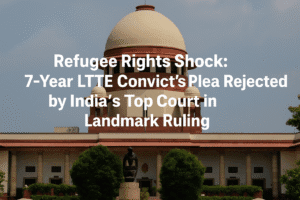Refugee Rights Shock: 7-Year LTTE Convict’s Plea Rejected by India’s Top Court in Landmark Ruling
In a landmark decision, India’s Supreme Court dismissed a plea by a Sri Lankan national seeking refuge from deportation, asserting the country cannot function as a “free shelter” (dharmashala) while managing its 1.4 billion population. The petitioner, arrested in 2015 for alleged ties to the banned LTTE terrorist group, served a seven-year sentence under anti-terror laws and faced post-release detention. The court rejected his claim to constitutional rights reserved for citizens, emphasizing procedural legality and national security.
Justices highlighted India’s socio-economic constraints, balancing sovereignty against humanitarian appeals. The ruling underscores India’s lack of formal refugee laws, relying instead on ad hoc measures amid rising global displacement. While reinforcing strict anti-terror policies, the case sparks debate over ethical obligations to at-risk groups versus domestic welfare priorities. Critics argue the decision risks weakening India’s historic role as a humanitarian haven, urging structured asylum frameworks to address such dilemmas transparently.

Refugee Rights Shock: 7-Year LTTE Convict’s Plea Rejected by India’s Top Court in Landmark Ruling
In a ruling that underscores India’s complex stance on refugee rights, the Supreme Court recently dismissed a plea by a Sri Lankan national seeking protection from deportation, sparking debate about humanitarian obligations versus national priorities. The case reveals tensions between security concerns, legal frameworks, and ethical dilemmas in a nation grappling with its own socio-economic challenges.
The Case at a Glance
The petitioner, arrested in 2015 for alleged ties to the Liberation Tigers of Tamil Eelam (LTTE)—a banned terrorist group in India—served a seven-year sentence under the Unlawful Activities (Prevention) Act (UAPA). After his release, he was detained in a refugee camp for three years, fearing persecution if returned to Sri Lanka. His plea emphasized family ties in India (his wife and children reside here) and sought refuge under Articles 19 (freedom of movement) and 21 (right to life) of the Indian Constitution.
The Court’s Firm Stance
The bench, comprising Justices Dipankar Datta and K Vinod Chandran, rejected his claims, asserting that Article 19 applies exclusively to Indian citizens. The court highlighted procedural adherence, noting his arrest and detention followed legal protocols. The justices’ sharp remark—“India is not a dharmashala [free shelter]”—reflects growing unease about accommodating refugees amid domestic pressures, including a population of 1.4 billion and strained resources.
Why This Case Matters
- Security vs. Human Rights: The petitioner’s LTTE links framed the case within national security concerns. India’s designation of LTTE as a terrorist organization stems from its role in Sri Lanka’s civil war and the assassination of former PM Rajiv Gandhi. The ruling reinforces strict enforcement against perceived threats, even post-sentence.
- Refugee Policy in Focus: Unlike countries with formal refugee laws, India lacks specific legislation, relying on ad hoc measures. While it has historically sheltered groups like Tibetans and Sri Lankan Tamils, recent cases (Rohingya, Afghan refugees) reveal a stricter approach. The court’s “dharmashala” comment signals reluctance to set precedents for non-citizens’ rights.
- Demographic Realities: With 140 crore people and socio-economic inequities, the court’s emphasis on “struggling to support” its population mirrors political narratives prioritizing citizens’ welfare. This raises ethical questions: Can a nation’s capacity justify limiting humanitarian aid?
Broader Implications
- Legal Precedent: The dismissal clarifies that foreign nationals cannot claim rights beyond Article 21’s basic protections (e.g., against unlawful detention). This could affect future asylum seekers.
- International Image: Critics argue the decision contrasts with India’s tradition of Vasudhaiva Kutumbakam (the world as one family). Human rights groups may scrutinize the ruling for overlooking non-refoulement principles, which prohibit returning individuals to danger.
- Political Undertones: The case arises amid rising global anti-immigrant sentiment and India’s tightened citizenship policies (e.g., CAA-NRC debates). It reflects a broader shift toward sovereignty-centric governance.
The Human Angle
While the court prioritized legal rigor, the petitioner’s plight—a decade in detention, family separation, and fear of persecution—highlights gaps in India’s refugee response. Activists argue for structured asylum laws to balance security and compassion, avoiding arbitrary outcomes.
Looking Ahead
This ruling underscores the need for India to codify its refugee policy, ensuring transparency and accountability. As climate crises and conflicts displace millions globally, nations face tough choices. For India, harmonizing its humanitarian heritage with pragmatic governance remains a delicate, unresolved challenge.
In essence, the case isn’t just about one man’s fate—it’s a microcosm of how nations navigate empathy, security, and survival in an unequal world.
You must be logged in to post a comment.